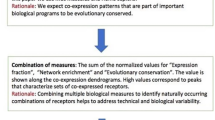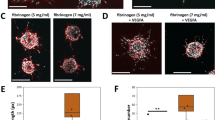Abstract
The serine protease urokinase-type plasminogen activator (uPA) is implicated in pericellular proteolysis in a variety of physiological and pathological processes including angiogenesis and tumor metastasis. The kringle domain of uPA (UK1) has proven to be an anti-angiogenic molecule with unknown mechanism and amino terminal fragment of uPA (u-ATF) with additional growth factor-like domain can be used for blocking interaction of uPA and uPA receptor. Here, we compared anti-angiogenic activities of these two molecules in vitro and in vivo. The recombinant u-ATF from E. coli and refolded in vitro was found to bind to uPAR with high affinity, whereas E. coli-derived UK1 showed no binding by Biacore analysis. In contrast to UK1 having potent inhibitory effect, u-ATF exhibited low inhibitory effect on bovine capillary endothelial cell growth (ED(50)>320 nM). Furthermore, u-ATF inhibition of VEGF-induced migration of human umbilical vein endothelial cell was far less sensitive (IC(50)= 600 nM) than those observed with UK1, and angiogenesis inhibition was marginal in chorioallantoic membrane. These results suggest that kringle domain alone is sufficient for potent anti- angiogenic activity and additional growth factor-like domain diverts this molecule in undergoing different mechanism such as inhibition of uPA/uPAR interaction rather than undergoing distinct anti- angiogenic mechanism driven by kringle domain.
Similar content being viewed by others
Article PDF
Author information
Authors and Affiliations
Rights and permissions
This is an Open Access article distributed under the terms of the Creative Commons Attribution Non-Commercial License (http://creativecommons.org/licenses/by-nc/3.0/) which permits unrestricted non-commercial use, distribution, and reproduction in any medium, provided the original work is properly cited.
About this article
Cite this article
Kim, K., Hong, YK., Lee, Y. et al. Differential inhibition of endothelial cell proliferation and migration by urokinase subdomains: amino-terminal fragment and kringle domain. Exp Mol Med 35, 578–585 (2003). https://doi.org/10.1038/emm.2003.76
Published:
Issue date:
DOI: https://doi.org/10.1038/emm.2003.76
Keywords
This article is cited by
-
Updates on Gene Therapy for Diabetic Retinopathy
Current Diabetes Reports (2020)
-
Proteolytically Inactive Recombinant Forms of Urokinase Suppress Migration of Endothelial Cells
Bulletin of Experimental Biology and Medicine (2014)



